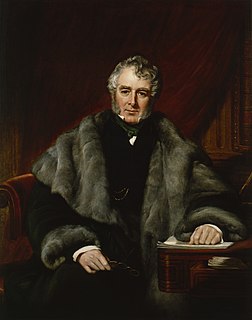A Quote by Napoleon Bonaparte
A true master of politics is able to calculate, down to the smallest fraction, the advantages to which he may put his very faults.
Related Quotes
Strange is the vigour in a brave man's soul. The strength of his spirit and his irresistible power, the greatness of his heart and the height of his condition, his mighty confidence and contempt of danger, his true security and repose in himself, his liberty to dare and do what he pleaseth, his alacrity in the midst of fears, his invincible temper, are advantages which make him master of fortune.
Nothing is more unjust, however common, than to charge with hypocrisy him that expresses zeal for those virtues which he neglects to practice; since he may be sincerely convinced of the advantages of conquering his passions without having yet obtained the victory as a man may be confident of the advantages of a voyage or a journey, without having courage or industry to undertake it, and may honestly recommend to others those attempts which he neglects himself.
Me, the bard out of work, the Lord has applied to His service. In the very beginning, He gave me the order to sing His praises night and day. The Master summoned the minstrel to His True Court. He clothed me with the robe of His true honour and eulogy. Since then, the True Name had become my ambrosial food.
Even though artists of all kinds claim to put their hearts and souls into their works, it will only confuse you, for example, if you try to discern a painter by his paintings. His masterpiece may be the master because of its iridescence; it may display a hundred different perspectives through his single face.
The friend who holds up before me the mirror, conceals not my smallest faults, warns me kindly, reproves me affectionately, when I have not performed my duty, he is my friend, however little he may appear so. But if a man praises and lauds me, never reproves me, overlooks my faults, and forgives them before I have repented, he is my enemy, however much he may appear my friend.
His master’s pain was his pain. And it hurt him more for his master to be sick than for him to be sick himself. When the house started burning down, that type of Negro would fight harder to put the master’s house out than the master himself would. But then you had another Negro out in the field. The house Negro was in the minority. The masses—the field Negroes were the masses. They were in the majority. When the master got sick, they prayed that he’d die. If his house caught on fire, they'd pray for a wind to come along and fan the breeze.
Think of something you really care about. Then add hour to hour and calculate the fraction of your life that you've actually spent in doing it. And then calculate the time you've spent on things like shaving, riding to and fro on buses, waiting in railway junctions, swapping dirty stories, and reading the newspapers.
The difference between the novice and the master is simply that the novice has not learnt, yet, how to do things in such a way that he can afford to make small mistakes. The master knows that the sequence of his actions will always allow him to cover his mistakes a little further down the line. It is this simple but essential knowledge which gives the work of a master carpenter its wonderful, smooth, relaxed, and almost unconcerned simplicity.
There are five dangerous faults which may affect a general: recklessness, which leads to destruction; cowardice, which leads to capture; a hasty temper, which can be provoked by insults; a delicacy of honour, which is sensitive to shame; over-solicitude for his men, which exposes him to worry and trouble.












































